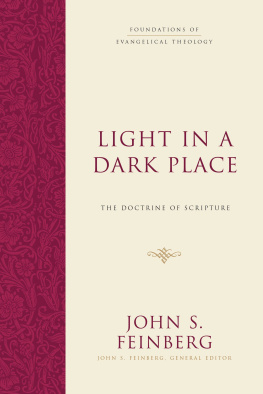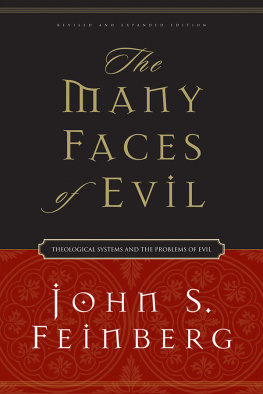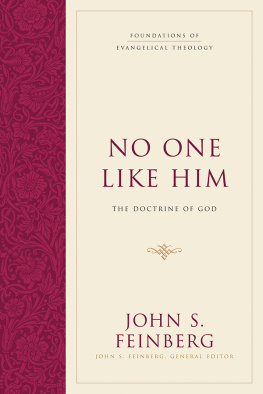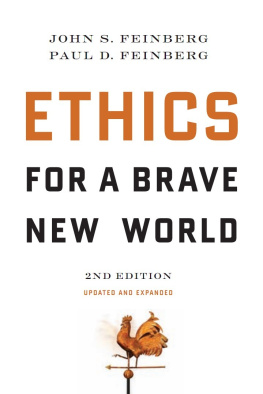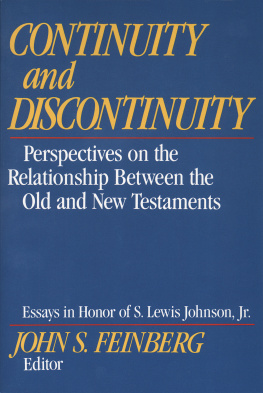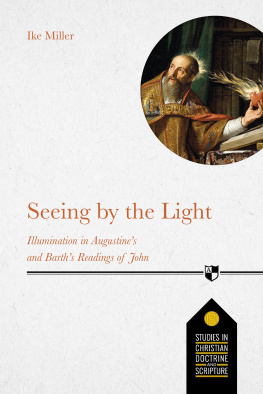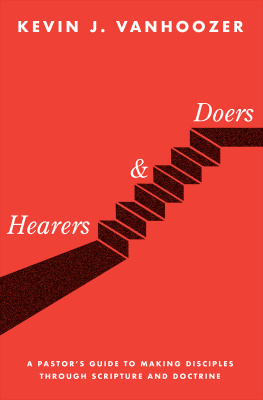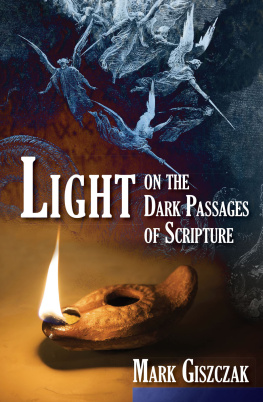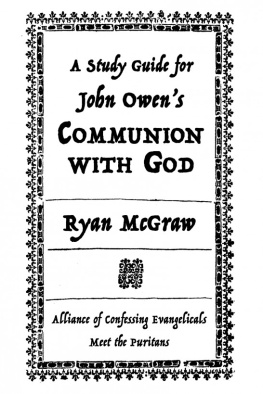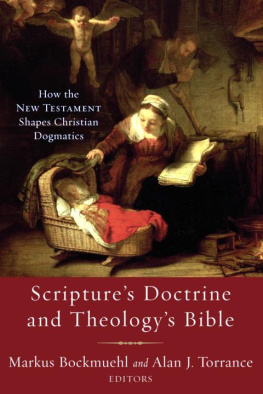John S. Feinberg - Light in a Dark Place: The Doctrine of Scripture
Here you can read online John S. Feinberg - Light in a Dark Place: The Doctrine of Scripture full text of the book (entire story) in english for free. Download pdf and epub, get meaning, cover and reviews about this ebook. year: 2018, publisher: Crossway, genre: Religion. Description of the work, (preface) as well as reviews are available. Best literature library LitArk.com created for fans of good reading and offers a wide selection of genres:
Romance novel
Science fiction
Adventure
Detective
Science
History
Home and family
Prose
Art
Politics
Computer
Non-fiction
Religion
Business
Children
Humor
Choose a favorite category and find really read worthwhile books. Enjoy immersion in the world of imagination, feel the emotions of the characters or learn something new for yourself, make an fascinating discovery.
- Book:Light in a Dark Place: The Doctrine of Scripture
- Author:
- Publisher:Crossway
- Genre:
- Year:2018
- Rating:3 / 5
- Favourites:Add to favourites
- Your mark:
- 60
- 1
- 2
- 3
- 4
- 5
Light in a Dark Place: The Doctrine of Scripture: summary, description and annotation
We offer to read an annotation, description, summary or preface (depends on what the author of the book "Light in a Dark Place: The Doctrine of Scripture" wrote himself). If you haven't found the necessary information about the book — write in the comments, we will try to find it.
Light in a Dark Place: The Doctrine of Scripture — read online for free the complete book (whole text) full work
Below is the text of the book, divided by pages. System saving the place of the last page read, allows you to conveniently read the book "Light in a Dark Place: The Doctrine of Scripture" online for free, without having to search again every time where you left off. Put a bookmark, and you can go to the page where you finished reading at any time.
Font size:
Interval:
Bookmark:
Thank you for downloading this Crossway book.
Sign-up for the Crossway Newsletter for updates on special offers, new resources, and exciting global ministry initiatives:
Crossway Newsletter
Or, if you prefer, we would love to connect with you online:
|
|
|
|
Chapter
Three
Special Revelation
Though natural revelation is available to everyone at all times in history, its content, though important, is somewhat limited. As for special revelation, it is at once broader, deeper, and narrower than natural revelation. It is broader in that its content covers many more subjects than does natural revelation, and its content comes in more forms or ways than does natural revelation. For example, scriptural special revelation covers not only spiritual truth; it also covers in both broad strokes (at times) and in specific details (at times) the history of Israel, the life of Christ, and the beginnings of the church. In addition, special revelation comes in words, visions, dreams, and acts, as well in the person Jesus Christ and in Scripture, whereas natural revelation is rooted in the created universe, including human nature.
Special revelation is broader than natural revelation, but there is some overlap in the contents of both. However, special revelation invariably goes deeper than does natural. For example, from natural revelation one can know that God exists and has certain attributes, but only from special revelation can we construct a detailed list of divine attributes, and define and distinguish them with precision. Moreover, from Scripture we can learn that God is triune, but no such information is available through natural revelation. And some topics are not covered at all in natural revelation, but in special revelation God has shown us much of his thinking. For example, from natural revelation one can discern ones guilt for disobeying moral rules, but nothing about how to satisfy the wrath and justice of God. In contrast, a major theme of special revelation is the message of salvation, including what God has done to purchase it, and what humans must do to receive forgiveness of sin and eternal life. In part because special revelation goes so deeply into key themes, like the plan of salvation, and in part because God did not give all of special revelation at once, it is special revelation that is progressive in nature. This is true not only of Scripture but also of other forms of special revelation, such as divine acts. Gods release of Abraham from the command to sacrifice Isaac, Gods removal of Israel from Egyptian bondage, and Gods potential salvation of all people from sin through the death and resurrection of Jesus Christ are all in some way related to personal or corporate salvation. But, surely, Gods saving act in Christ is the most intensive and extensive form of a saving act that God has done. In contrast, the content of natural revelation is, has been, and always will be essentially the same.
In spite of special revelation being broader and deeper, there is a sense in which it is narrower than natural revelation. Natural revelation is for everyone and accessible to everyone. It covers such broad topics as Gods existence and attributes as well as a general sense of right and wrong, and some basic moral norms. Of course, special revelation also covers these themes, but not in such a general way as does natural revelation.
In what sense, then, can special revelation be narrower than natural revelation? It is narrower because it isnt accessible to all people at all times and places. Even more, some things God said to one group of people at a given time were never intended to apply to everyone. For example, the Mosaic law with all of its elements was never given to all humanity. Even if one believes that during the OT era, non - Jewish peoples should have been evangelized and brought under the rule of the Mosaic code, it is hard to see this as being so during the NT era. The book of Hebrews, for example, should convince anyone that the OT sacrificial system is no longer in force. Moreover, Israel in the OT was a theocracy, but NT injunctions to submit to the powers in authorityat a time when the Roman Empire was the rulermake it unthinkable that the early church (or the church at any time after that) should have tried to impose a theocracy wherever Christians lived.
It isnt just verbal revelation that is narrower than natural revelation. As we shall see, much special revelation came in specific divine actions. Some of them were miracles, like the parting of the waters of the Red Sea, but some were not, like Gods use of Assyria and Egypt to judge Judah (as promised in Isa. 7:1725). But the revelation contained in many of those divine acts wasnt meant for everyone, only for a limited few. For example, when Jesus healed someone of a disease, only that person was healed, not every sick person, and the healing of one person was not a promise that others would also be healed.
Of course, special revelation is not just divine speech, but as we shall see, even nonverbal forms of special revelation come with language to explain the significance of what is revealed. Because special revelation includes language, it can cover more topics in greater depth, and it allows God to disclose specific things to particular persons that are not relevant to others. Without natural revelation it would be hard to understand such basic concepts as God as creator and sustainer of the universe, nor would it be so evident as to what sin is and why humans need to be saved. So, natural revelation supports special revelation, but special revelation explains everything contained in natural revelation, and special revelation addresses many more topics and themes than natural revelation could ever communicate.
From the preceding, it would be easy simply to equate special revelation with language and to think only of Scripture. Scripture is one form of divine revelation, but it is not the only kind of special revelation God has given. In what follows, I shall present the various forms of special revelation, according to Scripture.
Forms of Special Revelation
Some might approach a biblical study of special revelation by noting that the main Hebrew word for reveal is glh , and the main Greek word is apokalypt , and then by looking up each passage where these words occur and reading off the results. However, that approach would be wrong in two respects. First, if one decides to do a word study, many other Hebrew and Greek words are used to mean to disclose, unveil, uncover that which was hidden. For example, we could point to the Hebrew words qr , mar , and dbar . Those terms all refer to the transmitter of revelation. There are Hebrew terms that focus on the recipient and mean such things as to perceive, behold or see, discern, or look on. The Hebrew words in these cases are shama , hzh , and r h . In Greek, the NT also uses terms like phanero , phainomai , epiphain , and optomai . These terms can mean to manifest and to appear.
The second and more fundamental reason for not relying on a simple word study is that we are investigating the meaning of a concept, not the different ways a word can be used in various settings. A conceptual investigation seeks to understand what sort of thing the notion, in this case divine revelation, is. Theology involves conceptual articulation and clarification, so in our case the task is to consult any passage that incorporates the concept of divine revelation, regardless of what words the verse uses to convey that something was revealed. I shall use some of his material in what follows, but readers would find his article a very potent illustration of the need to define concepts, not just words, when doing theology.
Next pageFont size:
Interval:
Bookmark:
Similar books «Light in a Dark Place: The Doctrine of Scripture»
Look at similar books to Light in a Dark Place: The Doctrine of Scripture. We have selected literature similar in name and meaning in the hope of providing readers with more options to find new, interesting, not yet read works.
Discussion, reviews of the book Light in a Dark Place: The Doctrine of Scripture and just readers' own opinions. Leave your comments, write what you think about the work, its meaning or the main characters. Specify what exactly you liked and what you didn't like, and why you think so.

